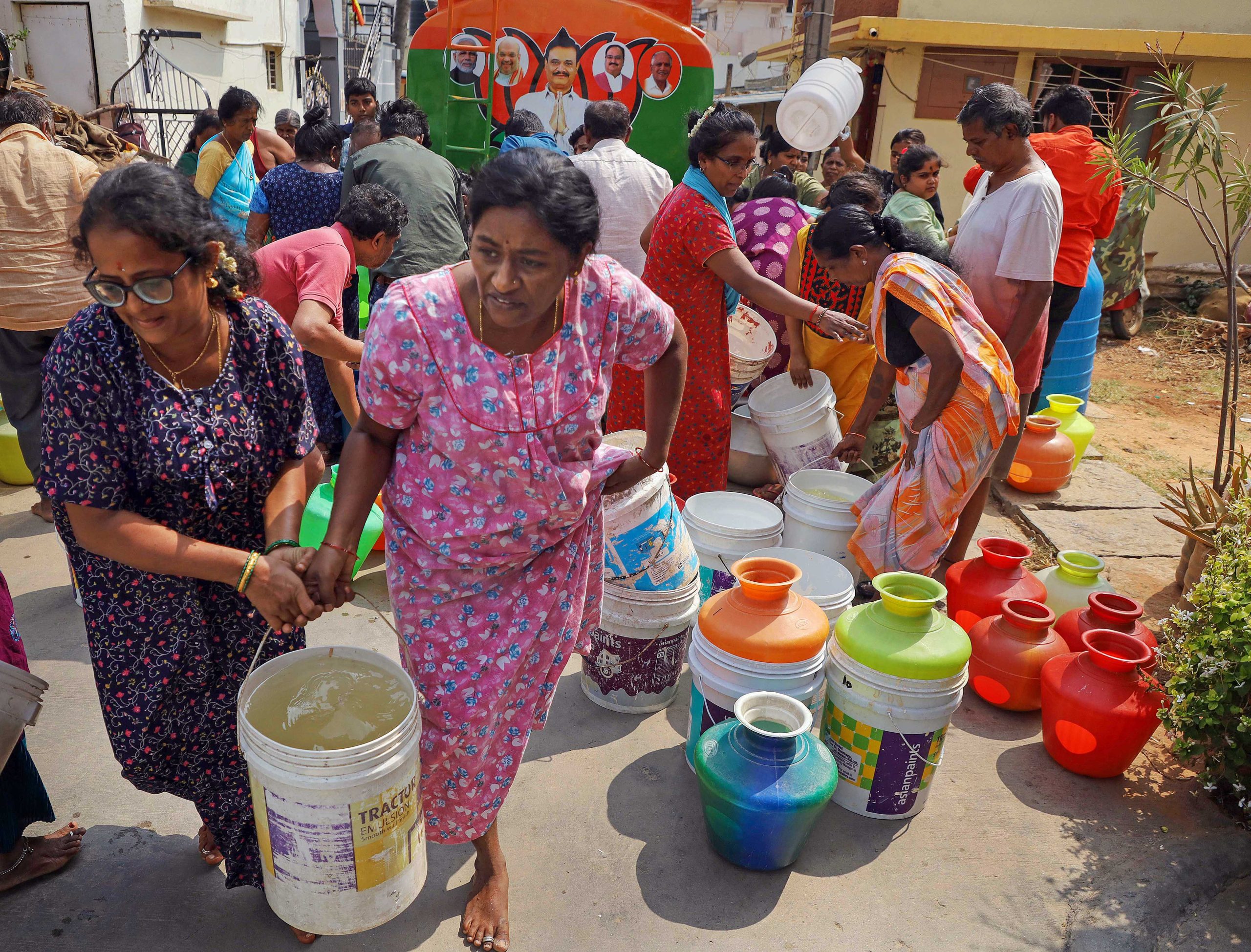2024-03-13 04:22:13

Several areas of Bengaluru are battling a water crisis over the past couple of months
Bengaluru:
Five showers in a month, ordering out instead of cooking and using treated water for non-drinking purposes – the water crisis in Bengaluru has pushed residents to the wall as they struggle for every drop. As the people adopt recycling methods to manage with less water, NDTV visited some parched areas and spoke to them about how life has changed.
Residents of suburban Babusapalya are dependent on water tankers for their daily supply, and that has taken a severe hit over the past couple of months.
“We need four tankers daily. We are getting only one or two. We are facing huge problems over the past two-three months,” one resident said.
Asked if the city administration’s order to fix tanker water rates has helped, a resident said, “The rates have stabilised, but the problem remains huge. We are not getting tankers on time because of high demand.”
A woman resident of an apartment complex in the area was leaving for work. When NDTV asked her about the towering water crisis, she replied, “We have a baby, it is very difficult. Tankers are not coming. The government has reduced the prices, but they are not coming. Even if they come, the water is not sufficient. I don’t know when this will get resolved and when we will get back to normal life.”
Asked if they are hopeful of better times once the monsoon comes, a resident flagged problems with the way in which successive governments implemented development projects. “They did not consider the (overall) well-being of people. The focus has been on building apartments and roads, but we need to work on the groundwater level. It has never been done. I have been here 15 years. I have never seen such measures by any government,” he said, adding that people are waiting in kilometre-long queues for drinking water.
One resident said he took a bath 5 times over the past one month.
Bengaluru primarily gets its water supply from two sources – Cauvery river and groundwater. For most non-drinking uses, recycled water processed by sewage treatment plants is used. With no rain for a while now, the primary sources have been stretched to their limits. Bengaluru needs 2,600-2,800 million litres of water daily, and the current supply is half of what’s required. The result is a daily struggle for the city’s residents.
The authorities have responded with fixed rates for tankers supplying water to residential areas following allegations of extortion. Fines have been announced for use of drinking water for cleaning vehicles, gardening or construction activities.
The water crisis has hit hospitals too. Brookfield Hospital near Whitefield, one of the parched areas in the city right now, depends on water tankers and needs 24,000 litres in three days. That’s not all, 5,000 litres are needed daily just for the dialysis unit.
Dr Pradeep Kumar, medical officer of Brookfield Hospital, said, “We are recycling water and using it along with regular water for washing and cleaning.”
Bengaluru has a huge chunk of the country’s migrant techies, who have flocked to the IT hub for the opportunities it offers. Now, they are looking at work-from-home options to minimise water use.
Shruthi, an engineer said, “Work-from-home will be a viable option, but only if people actually went home so that the population is reduced and water consumption drops.”
Bengaluru may be parched, but the political pot is boiling. The Opposition BJP has warned of protests, with Bengaluru South MP Tejasvi Surya accusing the Congress government of negligence. “The government failed to take up precautionary measures. As a result of this negligence, the people of Bengaluru are facing this tough water crisis,” he has said.
Deputy Chief Minister DK Shivakumar has brushed aside the allegations. “BJP must protest in Delhi for projects like Mahadayi. People like (former Chief Minister) Jagadish Shettar and (Union Minister) Prahlad Joshi will also benefit from drinking water,” he told the media. The Mahadayi project plans to divert river water to parched areas of Karnataka.
Such is the situation that cricket authorities are discussing if the M Chinnaswamy cricket stadium can host IPL matches later this month.
Another group of friends that has gathered at a coffee shop said the situation now is difficult to manage. Asked if the government’s steps are going to help in the long run, one of them said, “It’s only verbal diarrhoea. I don’t think the government is going to provide a better lifestyle to us.”
The residents said they meet at the coffee shop daily after playing badminton. “We stay in Pragati township. The government last year provided nine borewells for us. We used to get water till last month, but suddenly we came to know all the borewells have dried up. Getting water from tankers is very difficult because we have to book well in advance. We were paying Rs 700-800 (for water). Now the cost has gone up to Rs 1,500-Rs 2,000. And we are in March. So we don’t know what the situation will be if it does not rain. The civic body has initiated online water supply, but that has not been activated yet. The question is, if they take over the tankers, will we get water on time?”
The residents said the situation won’t be resolved overnight. “Digging more borewells or giving tankers won’t help. The government has to plan for at least 20 years. Only then will this problem be resolved permanently,” a resident said.
Another said not everything can be done by the government. “It is important for the people of Bengaluru to conserve water. We have to find solutions too. We cannot put everything on the government. We should also take initiatives to save water. That will help too,” he said.
Bengaluru water crisis,Bengaluru water crisis latest,Bengaluru water crisis news
Source link
![]()
